A
Woman Commands
|
 The King and Queen arrive at the church for the baby christening. |
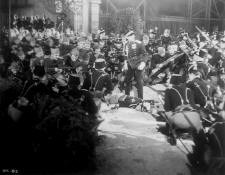 Fighting breaks out. |
"What a pity that Pola Negri should return in such a trite, impossible and worn-out theme. If she had anything to do, she would have done it well. Her bright spot is singing in a cabaret. The gal has a luring voice which records gorgeously. Basil Rathbone plays opposite and Roland Young makes much of nothing. Pola is beautiful and intriguing. See this for yourself." Photoplay, February 1932
|
A Woman Commands This picture, which brings the Polish star back to the screen for her first talker, may do fairly well in its first RKO New York stand, due to the heavy advance ballyhoo, the presence of Miss Negri in person at the premiere, accompanied by Mayor Walker himself. But when the introductory turmoil and noise are over and picture and star have to go on their own, it will be a different story. Feature promises but thin grosses. The story is an awkward combination of a musicalized "Zenda," a weak stab at continental elegance and a flavoring of both "Peck's Bad Boy" and "Nellie the Beautiful Cloak Model." The feminine interest is more on the order of the heroine of "Nellie" than the central figures of the other three. In tone and treatment there has not been a major subject of such confusing literary handling in a long time. What can be said of a story that starts out in the atmosphere of high caste military pre-Czaristic circles, with promise of hot and lively romance, plus a touch of high comedy on the side, and then goes broadly into modern low comedy opera-bouffe? Such a violent assault on plausibility would be plenty to discourage audience interest, but on top of that the tale later switches to straight court intrigue in one of those mythical European principalities. Earlier romantic characters, such as the young hero and Miss Negri's previous torch song heroine turn buffoon while the king, who has supplied the low comedy relief, surprisingly turns into a suave and almost regal hero. Thereafter a revolution of the most intricate sort with much rushing about of gold embroidered soldiers tearing toward an object that is never plain to anybody, but nevertheless providing a certain amount of medieval pageantry which represents more in negative costs than it does to sustain fan interest. Several of the spectacles might have furnished a picture with a punch if there had been any situation of vigorous background to make them stand up, but the film has no such props in it. Miss Negri herself never once managed to get over a vital personality, although the whole effort has been directed to that end. The high light of her performance is when, in the character of a cabaret singer, she sings two verses of a torch song in a rather agreeable contralto. Miss Negri is disclosed with a heavy foreign accent, although that was no detriment in a picture of foreign atmosphere. Acting honors go altogether to Roland Young. Basil Rathbone plays a stenciled guardsman lover with unusual inflexibility. H. B. Warner again performs his usual legerdemain of making a trivial role become an arresting character sketch. Rush. Variety, February 2, 1932 |
"Pola proves her charm and ability in this story that leaps all over the palace." Silver Screen, May 1932
"If the costume vehicle chosen for the occasion isn't entirely satisfactory, at least Pola proves that she may be greater in sound than she was in silence. Her voice is unusually pleasing." Modern Screen, April 1932
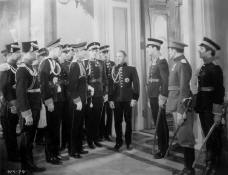 The king faces his captors. |
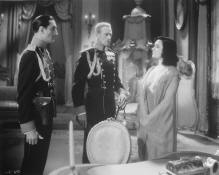 The colonel and Alex talk to Maria about her son. |
"Little can be said in favor of the enterprise. ... Basil Rathbone, H. B Warner, and Anthony Bushell are stuffed figures in uniforms." Pictureplay, May 1932
|
A Woman Commands Those responsible for the selection, treatment and production of the story are to be blamed for any failure of Pola Negri's "comeback" picture, "A Woman Commands," to completely satisfy film fans. You can bet your bottom dollar that when a cast which includes Roland Young, Basil Rathbone and H. B. Warner has difficulty in putting a story across, even if it were one of Grimm's fairy tales, then there is something haywire with the story. Pola herself struggles through the mystic mazes of plot as bravely as she now is fighting her way back to health in a Santa Monica hospital. Twice, when they stop the thing to allow her to sing an exquisite little number, "Paradise," composed for her by Nacio Herbert Brown, she demonstrates beyond question that, supported by a proper vehicle, she would be even better than the Pola of silent days. Possessing an unusually attractive singing voice, she puts into the rendition of the number of charm and deftness of touch that is delightful. All too soon, then, she is hurled back into the intrigues, such as they are, of one of those mythical George Barr McCutcheon kingdomsand what of it? Foremost in the characterization is Roland Young as the King. He is so good they shoot him in the last reel, for fear he will steal the picture. Oh, death, where is thy sting! He steals it anyhow. Rathbone fails to convince as the handsome lover chiefly, perhaps, because he is made out to be a little too much of a cad. It takes more expert handling than this one got to turn the heroine over to the villain and make the audience like it. H. B. Warner does the best he can with a rather thankless part. Reginald Owen went over to the Chaplin studios and borrowed an old mustache worn by Mack Swain, and it proved too much for him. May Boley tried to be funny as Pola's maid, but did not succeed. The picture does demonstrate, however, that la Negri is still an intriguing personality, and that her talents might be used profitably in talking pictures. It is to be hoped she has another and better opportunity. Leo Meehan Motion Picture Herald, January 2, 1932 |
"Pola Negri makes a big-time comeback in a comedy melodrama about a commoner who marries a king and proceeds to do the ruling. Besides emoting, the deep-voiced Pola singsvery well, thank you." Movie Classic, April 1932
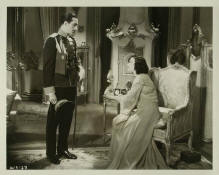 Alex encourages Maria to sign abdication papers. |
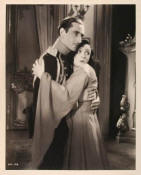 Reunited at last. |
"Although the picture, which boasts a beautiful cabaret entertainer, an impecunious guards officer and an impulsive king, is no masterpiece, it has several good episodes. The denouement is very tame, but there is always the acting of Roland Young, Basil Rathbone and H. B. Warner, besides Miss Negri." Mordaunt Hall, The New York Times, January 29, 1932
CANDID PHOTOS:
Back to Page One of review. See Page Three for pictures of posters, lobby cards and promo photos.








